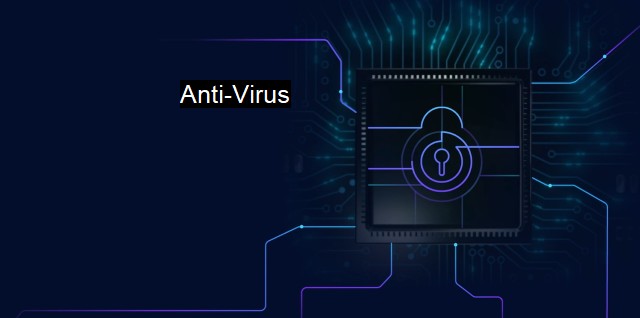What are Anti-Virus?
Protecting Your System from Malware: The Importance of Anti-Virus Software in Cybersecurity Defenses
Anti-virus refers to software designed to protect computers and electronic systems from malicious attacks, threats, and damage that may be caused by viruses and other of malicious software or 'malware'. The primary role of anti-virus software is to identify, neutralize or eliminate potential threats that have infected the host device or are actively seeking to do so. Modern anti-virus software detects a range of threats such as Trojans, ransomware, keyloggers, rootkits, worms, and phishing attacks, amongst others.Traditionally, viruses were programs designed to tamper with computers, leading to unauthorized replication or executable action. They could affect anyone from an individual user to entire corporations, or even governmental networks, causing significant damage, whether financial, operational, or in terms of data privacy and confidentiality. The first computer virus was identified in the early 1970s, a program titled 'Creeper', leading to a rapid upsurge in the development and advancement of anti-virus software.
The earliest forms of anti-virus software operated on signature-based detection, where the software would detect and nullify threats by identifying unique signatures from coding patterns within known threats. given the evolution of threats, and successful attempts at coding malware to avoid detection by 'disguising' its signature, this method is no longer sufficient on its own.
Modern cybersecurity threats also include zero-day exploits, wherein the hackers discover a vulnerability in the system before developers, allowing them access until the vulnerability is detected and patched. Today's advanced anti-virus software employ heuristic analysis techniques and machine learning to recognize patterns and behavioural anomalies associated with potential threats, and sandboxing methods to confine possible threats to an isolated environment on the system to observe their behavior, rendering them ineffective or nullifying them.
As techie as all this may sound, anti-virus software identity is far more commonplace, they are often preinstalled on our devices and are a major product dimension for corporations such as Microsoft (Windows Defender), Apple (XProtect), antivirus-specific companies like Norton, McAfee, and Kaspersky, amongst several others.
The continuous technological advancement and digital transformation calls for more sophisticated defence systems, and VPN encryption, firewalls, intrusion detection systems (IDS), intrusion prevention systems (IPS), and user behavior analytics are becoming integral parts of anti-virus systems.
Regardless of all its sophistication, anti-virus is not a standalone ‘cure-all’ entity. It rather plays a critical role in the larger cybersecurity landscape which includes regular system updates and patches, a strategy to deal with identified threats, and responsible user behaviour to avoid ‘falling’ for camouflaged threats. These camouflaged threats can present themselves as trusted software, emails, or even websites. Fileless malware, where malware infiltrates a trusted process to execute malicious commands, is another addition to the ever-evolving threat landscape.
Deploying a good anti-virus is indeed a critical step for cyberspace in the digital age, where the misuse of information has the potential to harm countries and their citizens. Also, it helps organizations to comply with the law and regulators that cybersecurity measures are in place.
Anti-virus is a well-established but constantly evolving aspect of cybersecurity, designed to soften the ever-increasing blows from hackers and would-be cyber-criminals. Its importance rests largely on the speed of its adaptation to the convoluted arena of malware and hackers and its deep integration into larger strategies, including user education and behavioural management. In the end, cybersecurity, and within that, a good anti-virus, is about resilience – the ability to bounce back, as no system or strategy can ever be 100% foolproof.

Anti-Virus FAQs
What is an anti-virus software?
An anti-virus software is a program that is designed to protect your computer from different types of malware, such as viruses, worms, trojans, and other malicious software. It scans your computer regularly and detects any potential threats that could harm your system.How does an anti-virus software work?
An anti-virus software uses a variety of techniques to detect and eliminate malware. These include signature-based scanning, behavior-based scanning, heuristic analysis, and sandboxing. When a threat is detected, the software either quarantines, deletes, or repairs the infected file.How often should I update my anti-virus software?
It is recommended that you update your anti-virus software regularly, ideally on a daily basis. This is because new malware is constantly emerging and it's important to have the latest protection against these threats. Some anti-virus software can be set up to update automatically or you can manually check for updates.What else can I do to protect my computer besides using an anti-virus software?
In addition to using an anti-virus software, it's important to practice safe browsing habits. This includes avoiding suspicious websites, not clicking on links from unknown sources, and being cautious when downloading attachments. You can also use a firewall, enable two-factor authentication, and keep your operating system and other software up to date.| | A | | | B | | | C | | | D | | | E | | | F | | | G | | | H | | | I | | | J | | | K | | | L | | | M | |
| | N | | | O | | | P | | | Q | | | R | | | S | | | T | | | U | | | V | | | W | | | X | | | Y | | | Z | |
| | 1 | | | 2 | | | 3 | | | 4 | | | 7 | | | 8 | | |||||||